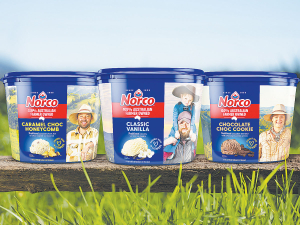Flood-hit Aussie co-op shuts plant, sheds staff
One of Australia's last remaining dairy co-operatives has closed its ice cream factory and sent staff home eight months after devastating floods ripped through its operations.
 Australia’s largest dairy co-operative Norco is back making ice cream, 18 months after a catastrophic flood destroyed its manufacturing plant.
Australia’s largest dairy co-operative Norco is back making ice cream, 18 months after a catastrophic flood destroyed its manufacturing plant.
Australia's largest dairy co-operative Norco is back making ice cream, 18 months after a catastrophic flood destroyed its manufacturing plant.
Norco, which is also Australia's oldest dairy co-op, has announced it will be launching two new ranges this summer, including the much-anticipated return of Norco Cape Byron, a premium ice cream brand from the mid-1990s.
While the co-op has not commented on the final cost of the rebuild, Australian media reports say that it would be in the vicinity of A$60m-$70m.
Norco was awarded a $34.7m anchor business support grant from the federal and NSW governments to assist with the rebuild, with $21.38m received and accounted for during the 2022-23 year.
Chief executive Michael Hampson told ABC Rural that a significant level of flood mitigation works have been done and a significant amount of automation.
He says the resilience measures built into the site were up to a 15-metre level, higher than the 2022 record floods.
"Previously that site, if it had a 12.2m flood, which is 1974 flood height, you would be down for a couple of days while you clean up the yards," he says.
"Our ambition is, if we end up having a flood like what we had last time, that we might be down for a week whilst we tidy a few things up, and as soon as power and services are restored to the region, we'll be able to back up and operate."
To relaunch its new ice cream range, Norco roped in cookbook author and Northern Rivers food afficionado, Magdalena Roze.
"Living in the Northern Rivers, partnering with Norco just made sense as we both hold a deep connection with our local communities, and are always looking for ways to give back to the region. That's what farmer owned, Australian owned and Australian made is all about," says Roze.
"We are surrounded by dairy farms here, so Norco is a big part of the Northern Rivers fabric. It's a heritage brand that we know and love, so I'm excited and honoured to be a part of this delicious next chapter."
Also being launched into supermarket freezers is Norco's 100% Australian Farmer Owned range, a celebration of Norco's milestone of over 70 years of making ice cream in the heart of Lismore.
Ben Menzies, Norco general manager of commercial and strategy explains the connection between dairy quality and ice cream craftsmanship: "We are proud of our ability to combine the rich and creamy milk produced by a co-operative of passionate Norco dairy farmers, with our expertise in crafting the tastiest ice cream on the market," says Menzies.
"With over 128 years of expertise in dairy, we understand the simple pleasures derived from sharing good quality ice cream with family and friends, and pride ourselves on our ability to deliver products that put a smile on the faces of all those who enjoy dairy," he says.
Established in Byron Bay, New South Wales in 1895 Norco is owned by 281 active members on 188 dairy farms in northern New South Wales and southeast Queensland. Annual milk production is 226 million litres.
Voting has started for the renewal of DairyNZ's milksolids levy.
The most successful catchment groups in NZ are those that have 'a source to sea' approach.
Associate Agriculture Minister and Manawatu dairy farmer Andrew Hoggard says the free trade agreement (FTA) negotiated with India is not a bad deal and his party, Act, will support it when it goes before Parliament.
Newly released data from Environment Canterbury (ECan) Farm Environment Plan (FEP) audits are showing a dramatic lift in environmental performance across the region.
A solid recovery of global dairy prices this year makes a $9.50/kgMS milk price almost a shoo-in for this season.
As New Zealand marks the United Nations’ International Year of the Woman Farmer 2026 (IYWF 2026), industry leaders are challenging the misconception that women only support farming.
OPINION: Fonterra may be on the verge of selling its consumer business in New Zealand, but the co-operative is not…
OPINION: What does the birth rate in China have to do with stock trading? Just ask a2 Milk Company.